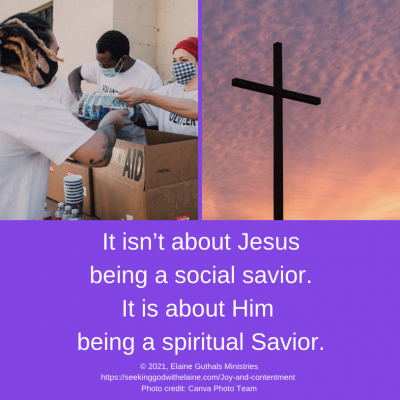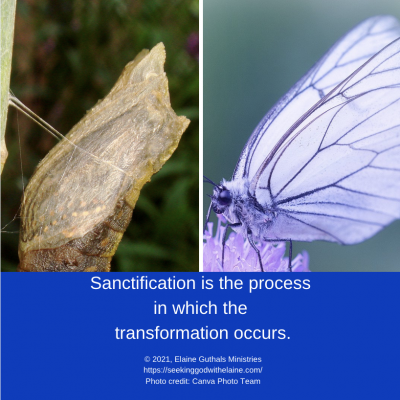Paul made the connection between joy and contentment. This daily devotional looks at that connection and how the choices we make affect that.
Nuggets
- Paul was one to show genuine gratitude.
- Paul’s joy was not found in worldly circumstances, so he could be content in all circumstances.
- Adapting to circumstances knowing God is in control brings contentment.
Devotions in the Joy in the Gospel series

Paul knew that where there is joy in the Lord, there is contentment. He wanted the Philippians to experience this.
Let's Put It into Context #1
Here is a running list of what we’ve discussed previously.
Let's Put It into Context #2
Joy, given to us by the Holy Spirit, is an outward expression of an inward feeling of thanksgiving and the consciousness of God’s infinite goodness that enlivens and comforts us.
Contentment is being satisfied regardless of the circumstances of our lives.
Devotions in the Contentment Leads to Tranquility series
A Deserved Thank You
“I rejoiced in the Lord greatly because once again you renewed your care for me. You were, in fact, concerned about me but lacked the opportunity to show it” (Phil. 4: 10 CSB)
Paul was one to show genuine gratitude.
When we were doing Romans Part II, we looked at Paul’s team. He may have been the one hefting the pen and standing up giving the sermon, but he had a group that was helping him and supporting him.
To read a related devotion, click the button below.
Paul considered the Philippians part of the team. In fact, they were partners (Phil. 1: 5).
God doesn’t want us to do everything alone. Yes, He does give us individual tasks to do.
But God has made us a community so that we can work together. This allows us to work to our talents that He has given us. We can encourage each other.
Paul considered what they did a gift. We say sometimes that it isn’t the gift but the thought behind it. Lyth said that he acknowledged the motivation behind the gift — the Spirit.
Resource
Let’s look at the verse this way.
“I rejoiced in the Lord greatly …” (Phil. 4: 10 CSB)
Paul saw this as a gift from the Lord. God used to the Philippians to provide for Him.
I think so many times we are so used to doing for ourselves that, when someone tries to do something for us, we don’t see it as God providing for us. We don’t see His hand in it.
Mom took it another way. After she got her cancer, she said that it was hard letting other people do something for her. However, if she didn’t, they wouldn’t get their blessing.
The moral of this story is we have to see how God is using the situation. We have to follow His cues in letting it play out. Then we let our gratitude be front and center.
“… because once again you renewed your care for me …” (Phil. 4: 10 CSB)
Paul used this moment to thank them for the past support. A one-time gift is great. Multiple gifts are greater.
But Paul also made it personal here. The Philippians were supporting God’s work, but they were also supporting Paul.
It does make supporting God’s work easier when we agree with and like the messenger, doesn’t it? Sometimes, we could be called to support God’s work even if we don’t.
The important words are God’s work.
“… You were, in fact, concerned about me but lacked the opportunity to show it” (Phil. 4: 10 CSB)
It seems Paul did a little backpedal here. It sounds like there had been a break in the support.
I read this as Paul was reassuring the Philippians that the break was okay. He knew they had kept praying for him — they were partners.
There was something that prevented them from sending support. Vaughan said that Paul didn’t want the Philippians to feel there was any reproach in his statements.
Resource
The inward support was there even if the outward verification wasn’t.
This goes back to opportunity. We just talked about opportunity as being the set amount of time in which we can attend to the spiritual needs of others.
To read a related devotion, click the button below.
Really, that applies to us, also. When God calls, we have to answer. That is our opportunity.
Being a disciple is all about caring for others. It isn’t about Jesus being a social savior. It is about Him being a spiritual Savior.

When we do the work God has for us, He will abundantly supply our needs.
Contentment in All Things
“I don’t say this out of need, for I have learned to be content in whatever circumstances I find myself.” (Phil. 4: 11: CSB)
Paul’s joy was not found in worldly circumstances, so he could be content in all circumstances.
Paul also didn’t want to let the Philippians think that he had been sorely lacking their support when they took the break. He was content with whatever situation in which God put him.
When Saul became Paul, he may know have had this contentment. Elsewhere, Paul told us he was covetous. Covetousness is an inordinate greed for wealth and possessions.
Paul said this was something he learned. “… I have learned to be content in whatever circumstances I find myself.” (Phil. 4: 11: CSB).
Where did Paul learn it? Cooper wrote, “Paul learned it at the feet of Jesus, in the school of Christian experience, where we may learn it too.
Resource
Think about it. Paul had been in some pretty rough circumstances. Second Corinthians 11: 24-27 gives a good rundown of everything Paul faced.
Watkinson said that this did not mean that we should expect to be homeless or hungry for being a disciple of Christ’s. It didn’t mean we shouldn’t work to improve our situation.
Resource
It meant we are not supposed to rail against God when we find ourselves in challenging circumstances. We are to be content.

Beecher explained it this way. He wrote, “He had learned to be content because he carried about with him that which made any circumstances blessed.”
Resource
We shouldn’t let the challenging circumstances of our lives steal the joy. If we don’t have the joy, our salvation is suspect.
To read a related devotion, click the button below.
Look what else Paul said. “… in whatever circumstances I find myself.” (Phil. 4: 11: CSB).
Beecher said that what Paul was really saying was in all circumstances. He was content even if he bounced back and forth between the two extremes of good and bad circumstances.
Paul could do that because he was focused on God and His plan for his life. He was also focused on the prize of the next life.
It is easier to focus on God because, being a disciple, we don’t have some of the worldly pulls that make us lose our contentment. Cooper gave us a list.
- Pride
- Self-centeredness
- Covetousness
We know that God is the God of the impossible (Mt. 19: 26). Being content, Spencer said, doesn’t hold that up as our goal.
Resource
On the other hand, we aren’t to be anxious about our lives. Paul had just told the Philippians “Do not be anxious about anything …” (Phil. 4: 6 NIV). Instead, we are to cast “… all your cares on him …” (I Pet. 5: 7 CSB).
Neither are we to feel ambivalent about things. If we are, we won’t feel the desire to witness to help people escape the sin of this world.
Spencer said that Paul addressed his trials with the attitude “Thy will be done.” When we do that, we show that our hope is in God.
Related Links
Hillary Scott
Barrow said that our contentment shows that God is in control. We know everything is happening because He allows it.
Anderson made a great comment. He said that we aren’t supposed to be content with our spiritual condition. This contentment should be with our worldly portion.
Resource
There is always room for improvement in our relationship with God. We always sin — yes, even disciples (I Jn. 1: 8).
Adapting to Circumstances
“I know how to make do with little, and I know how to make do with a lot. In any and all circumstances I have learned the secret of being content — whether well fed or hungry, whether in abundance or in need” (Phil. 4: 12 CSB)
Adapting to circumstances knowing God is in control brings contentment.
Lyth read this as we should expect changes on our lives. I get that. We are on a transformation on the Sanctification Road. He said we need to adapt as we are instructed by the Holy Spirit.
Resource

Brooks said Paul had double knowledge. Think about it a second. Let’s apply this to money.
Resource
Paul knew how to be rich as well as how to be poor.
Paul knew how to keep grounded when all this money started flying into his bank account. He didn’t get a big head. He didn’t turn snobbish to those he felt were beneath him. He didn’t expected the churches to be on a set schedule giving him donations.
But Paul also knew how to keep grounded when he was poor. He knew how to work when the churches didn’t send him money. He knew how to stretch things. He knew how to do without.
Paul was grounded in God.
Once again, Paul said it was something he had to learn. He didn’t learn that in Pharisee school.
Paul learned that as he lived II Corinthians 11: 24-27. We would call it the school of hard knocks.
We also have the school of Christ. Remember Cooper talked about learning at the feet of Jesus?
Cadman said we can learn to weather the changes in our lives. We learn humility — and usually have that lesson repeated several times. We learn how to focus on Heaven during this lifetime.
Resource

Making the Connections
A joy of faith is based on Christ. Much of our joy comes from our salvation. Our joy should mirror the quality of God’s.
We choose to be content. We choose whether we will be satisfied or dissatisfied.
When we allow the joy to show through, we have contentment.
How Do We Apply This?
- Live as closely as we can to God so that we have reason to be content.
- Being focused on God has a learning curve.
- Walk in the Spirit.
- Know God has a plan for our lives, and He will work the plan.
- Know God loves us. Know Jesus loves us.
- Follow what Spencer said Paul’s game plan was: work, plan, and pray.
- Not give voice to our displeasure with our lives.
- Shout our pleasure with how God deals with our lives.
- Meet our needs through ways of which God approves.
- Not be content with our spiritual condition.
To read a related devotion, click the button below.
Resource
Father God. We look to You for joy. When we actively seek Your joy, we will find contentment. Help us to focus on You. Amen.
The ABCDs of Salvation
If you have not become a believer in Christ, please read through the
Plan of Salvation and prayerfully consider what God is asking you to do.
A – admit our sins
B – believe His Son Jesus is our Redeemer
C – confess God as Sovereign Lord
D – demonstrate that commitment by making any changes needed in our lives to
live the way in which God has called us
The Disciple’s Job Description
What do you think?
Leave me a comment below (about this or anything else) or head over to my Facebook group for some interactive discussion.
If you don’t understand something and would like further clarification, please contact me.
If you have not signed up for the email daily or weekly providing the link to the devotions and the newsletter, do so below.
If God has used this devotion to speak with you, consider sharing it on social media.